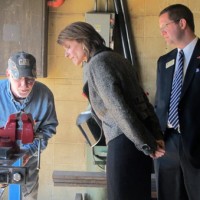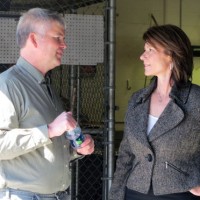Bustos uses information from tour for student loan legislation
- Details
- Published on Tuesday, 09 April 2013 16:16
- Written by Paul Gordon
Cheri Bustos came away from a tour of community colleges in west-central Illinois pleased with the attention those schools are giving to filling job skills needs in the region.
But the new Democrat U.S. Representative for the 17th District also recognized areas where she can help build and sustain momentum and pledged to do so, she said Tuesday as she prepared to head back to Washington, D.C.
She fulfilled the pledge upon her return when she join other members of the U.S. House in introducing the Student Loan Affordability Act, which would prevent student loan interest rates from doubling on July 1. The bill would extend the current low interest rate for Stafford student loans at 3.4 percent for two additional years. Unless Congress takes action, the student loan interest rate will double to 6.8 percent on July 1.
(Photo courtesy of Spoon River College) U.S. Rep. Cheri Bustos, D-East Moline, watches welding instructor Mark Coulter during a class at Spoon River College last week. Behind Bustos is Curtos Oldfield, president of the college.If student loan interest rates were to double, this would mean a student taking out the maximum Stafford student loan of $23,000 would pay an additional $11,000 of interest over the 20 year repayment period of the loan.
"That was one of the main concerns I heard on the tour, from students and the colleges themselves. I learned there is real fear that student loan interest rates will double and that could make college unaffordable to that many more people. I want to be part of making sure that doesn't happen," Bustos said.
Last week the Congresswoman toured the seven community colleges within the 17th District, including Illinois Central College in East Peoria, Spoon River College in Canton and Carl Sandburg College in Galesburg. She called it the "Communities Working Together For Jobs" with the purpose of learning what ways local community colleges and businesses work together to address the skills gap, increase American manufacturing and put people back to work.
It also, she said, was an opportunity for her to find out whether legislative failures of the past had gotten in the way of progress toward communities working together and, if so, whether legislative fixes could help them do better.
Regarding student financial aid, another common problem was that some government aid, particularly Pell Grants, don't cover summer courses. That can prevent some students from getting necessary coursework done in summer school, when it can be the optimum time because of work scheduling.(Photo courtesy of Spoon River College) U.S. Rep. Cheri Bustos talks with Jeff Bash, sustainable agriculture instructor at Spoon River College during her tour of that Canton college and other colleges in her district last week.
"I want to find out why that is and what we can do about it," she said.
Noting she has three sons, Bustos she she knows firsthand how important a quality and affordable education is to building a middle class life. The colleges and universities in our region offer a pathway to success to many, so I'll continue to do everything I can to help make them affordable and accessible for all."
In 2007, Congress passed the College Cost Reduction and Access Act, which lowered federally subsidized Stafford student loan rates from 6.8% to 3.4%. This act originally expired on July 1, 2012. Last June, Congress passed a bipartisan compromise to extend the low student loan rates through July 1, 2013.
Bustos said she learned a lot about how community colleges can help with the job skills gaps that exist in svseral industries, including manufacturing and health care. "A lot of jobs go unfilled because of the skills gaps, but there are a lot of different areas where community colleges can help. People have to know the help is there," she said.
"What I found most interesting was learning just how adaptable and malleable community colleges are. The 'ivory tower' stereotypes of universities don't apply to community colleges. They are out there in the community, talking with community leaders and business leaders and finding out just what is needed. And they are there for everybody, for all walks of life," Bustos said.
During the tour she learned most of the schools offer welding programs, which is a skill set most manufacturers say are needed. Most also offer training in several different health related fields.
Some schools have specialties, as well. Schools in the southern part of the district have agriculture-related programs, while ICC and Spoon River have programs that focus on Diesel mechanics. One of the most interesting, she said, is the mortuary science program at Carl Sandburg College in Galesburg.
"Really, each college has its own unique characteristics. Yet there were a lot of common characteristics, also," she said, adding those were the one borne out of recognizing the need for strong math and science skills.
"I would say one of the real surprises for me was learning how much of a need there is for learning soft skills at the community college level. I'm talking about things from just being able to look somebody in the eye when talking to them to work ethics. These were things I thought most people learned starting in kindergarten. So frankly, I was surprised that was such a large part of the dialogue," she said.
Bustos said the tour was invaluable. "These are the people I report to, the residents of my district. I was there to listen and help identify needs and solutions," she said.



















































